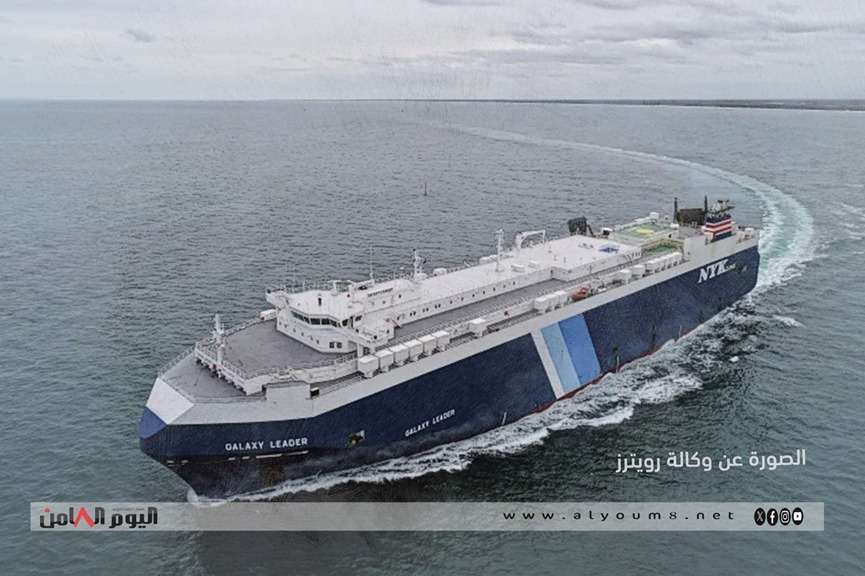An international coalition to protect navigation in Bab al-Mandab...
Jeddah port at the heart of the crisis and Riyadh asks Washington for restraint in response to Houthi attacks
Saudi Arabia has asked the United States for restraint in responding to Houthi attacks on ships in the Red Sea, fearing the failure of direct talks between the Saudis and the Houthis, which Riyadh intends to host a new agreement between Tehran's proxies and Riyadh's Yemeni allies.

Galaxy Leader hijacked by Houthis last November – About (Reuters)
Iranian proxies in Yemen - the "armed Houthi group" - put the Saudi port of Jeddah at the heart of the navigational crisis, following the Houthis' obstruction of the arrival of a cargo ship coming from the Sultanate of Oman, to the Saudi port, while Riyadh sent a letter to Washington, calling for restraint in responding to the Houthi attacks, in the readiness of the United States of America to form a maritime coalition to protect navigation in the Red Sea and Bab al-Mandab.
The Iranian arms in Yemen continue their military escalation in the Red Sea and Bab al-Mandab, preventing the passage of cargo ships from passing, as part of a conflict waged by Tehran's proxies against Tel Aviv, while international moves have escalated to form an expanded maritime alliance, to prevent Houthi threats on shipping lines, and Saudi Arabia, the United States of America, asked for restraint in responding to Houthi attacks, so as not to affect an agreement Riyadh seeks to push its proxies in Yemen (Presidential Leadership Council) to sign a truce agreement with the Houthis.
The Houthis said they were targeting ships in the southern Red Sea and the Bab al-Mandab Strait, in support of Palestinians in the midst of the Israeli and Hamas war in the Gaza Strip.
On Thursday, a Danish shipping company said its Maersk Gibraltar was targeted by a missile while en route from Salalah in Oman to Jeddah in Saudi Arabia.
The Houthis said they hit the tanker with a drone, despite the Danish shipping company's denials, but Tehran's proxies confirm that the Saudi port of Jeddah will be mainly affected by these attacks.
On November 19, the Houthis announced the seizure of the cargo ship "Galaxy Leader", owned by an Israeli businessman, in the Red Sea, and took it to the Yemeni coast, in solidarity with the "Palestinian resistance in the Gaza Strip," according to Houthi military spokesman Yahya Saree.
On Dec. 3, the Pentagon said three commercial ships had been attacked in international waters in the southern Red Sea, and the Houthis claimed responsibility for drone and missile attacks on two Israeli ships in the area, and on Dec. 15, the Pentagon said a projectile fired from a Houthi-controlled area of Yemen hit the Liberian-flagged German-owned al-Jasra, causing a fire but no injuries.
On Dec. 15, Iranian proxies in Yemen claimed responsibility for a drone attack on a Maersk ship sailing toward Israel, but says the tanker was targeted by a missile. Shipping sources said on Thursday that Maersk Tankers ships had the option to change their route through the Cape of Good Hope due to the deteriorating security situation in the Red Sea.
The attack came after Iranian proxies warned on Dec. 9 that they could target all ships bound for Israel regardless of nationality, and warned all international shipping companies against dealing with Israeli ports.
Reuters reported that Saudi Arabia sent a letter to the United States in which the latter asked for restraint in responding to the Houthi attacks in Bab al-Mandab and the Red Sea. Riyadh's message of restraint to Washington is aimed at avoiding further escalation, and Riyadh has so far been satisfied with the way the United States is handling the situation.
Saudi Foreign Minister Prince Faisal bin Farhan said there was no need for further escalation in the region, in response to a question about attacks by the Houthi militia in the Red Sea.
The sources told Reuters that Saudi Arabia is seeking to advance the peace process in Yemen despite the outbreak of war in Gaza for fear of spilling over there, as Riyadh avoids the failure of direct peace talks with the pro-Iranian Houthis, as Riyadh prepares to sign an interim agreement between the Presidential Leadership Council and the pro-Iranian Houthis.
Saudi Arabia's message came on the heels of Washington's announcement of the formation of "the broadest possible maritime coalition" to protect ships in the Red Sea and sending an "important signal" to the Houthis that "no further attacks will be tolerated," Reuters quoted the US envoy to Yemen, Tim Lenderking.
"The United States aims to expand the existing international maritime task force into an international coalition that devotes some resources to protecting freedom of navigation," he said.
The current Red Sea and Gulf of Aden Task Force, known as Joint Task Force 153, is a 39-nation coalition led by the vice-admiral of the U.S. Fifth Fleet based in Bahrain.
The Southern Transitional Council (STC), the political authority in the south, announced its intention to work alongside the international community in protecting navigation from terrorist threats, with Aidarous al-Zubaidi, a deputy on the Saudi-backed Presidential Command Council, announcing the readiness of his military forces to participate in any international effort to protect ship traffic in the Bab al-Mandab and the Gulf of Aden.
"Our naval forces have the competencies and capabilities that make them capable of playing a pivotal role in protecting our territorial waters and contributing to enhancing maritime security and protecting international shipping lanes, along with the coast guard and other naval forces in the international coalition, and we will continue the process of rebuilding them and developing their capabilities until they regain their position and play their role to the fullest," Al-Zubaidi said during his meeting with the Commander of the Naval Forces, Lieutenant General Abdullah Salem Al-Nakh'i in Aden.
But Saudi Arabia's allies in Yemen—the head of the Presidential Command Council, Rashad al-Alimi and his followers—had a different position than al-Zubaidi, with forces affiliated with Al-Alimi denying media claims that they were ready to participate in any international effort to protect Bab al-Mandab and repel Houthi attacks.
Turkey's Anadolu Agency said that the government of the Presidential Leadership Council, headed by Maeen Abdul Malik, denied its participation in a new international coalition to protect shipping lines, commenting on news in this regard.
"The circulating news that the Yemeni government is participating in a new international coalition to protect shipping lanes that are subjected to terrorist attacks by the Houthi militias is not true and we did not know our participation," the government said.



